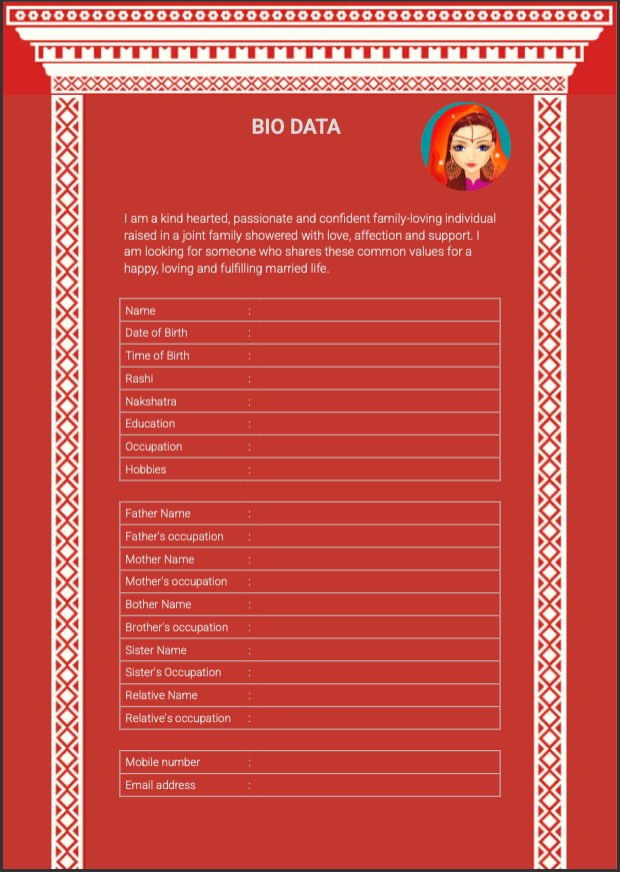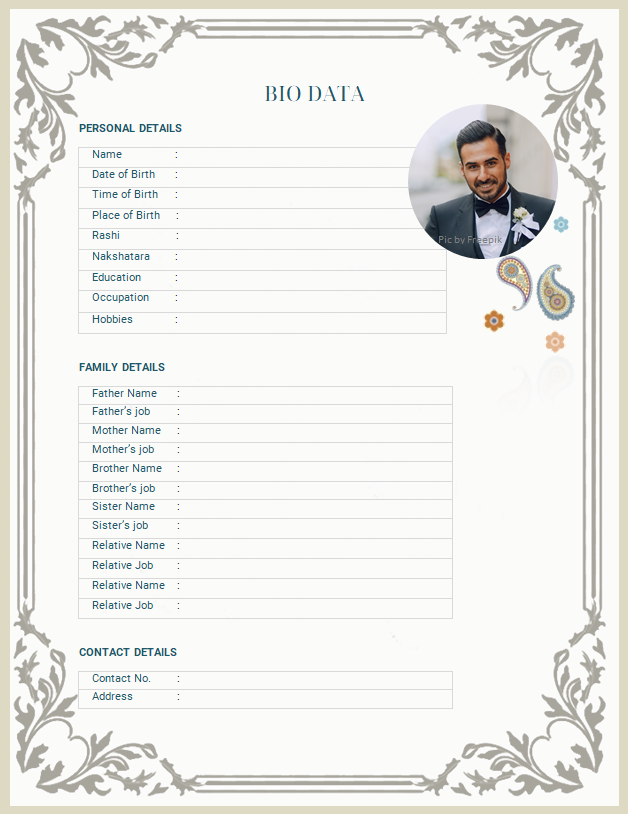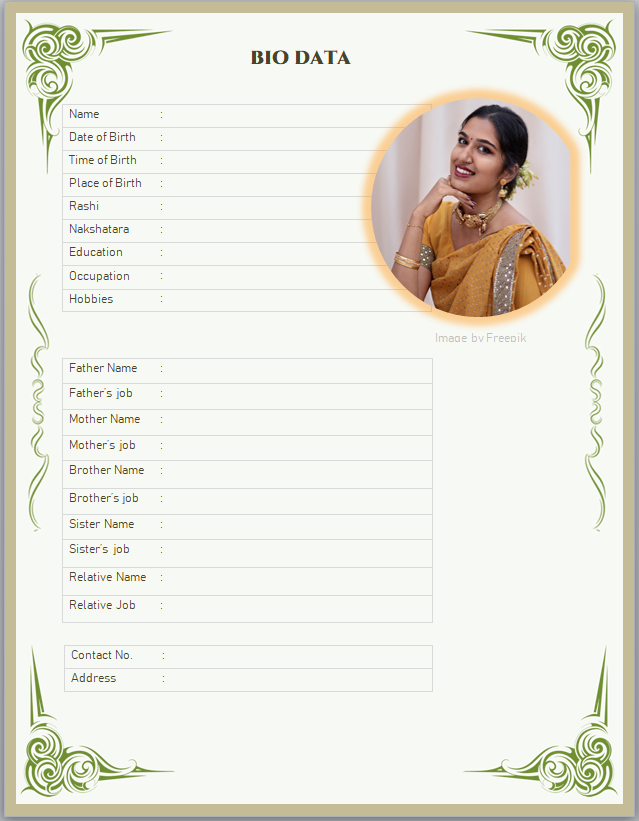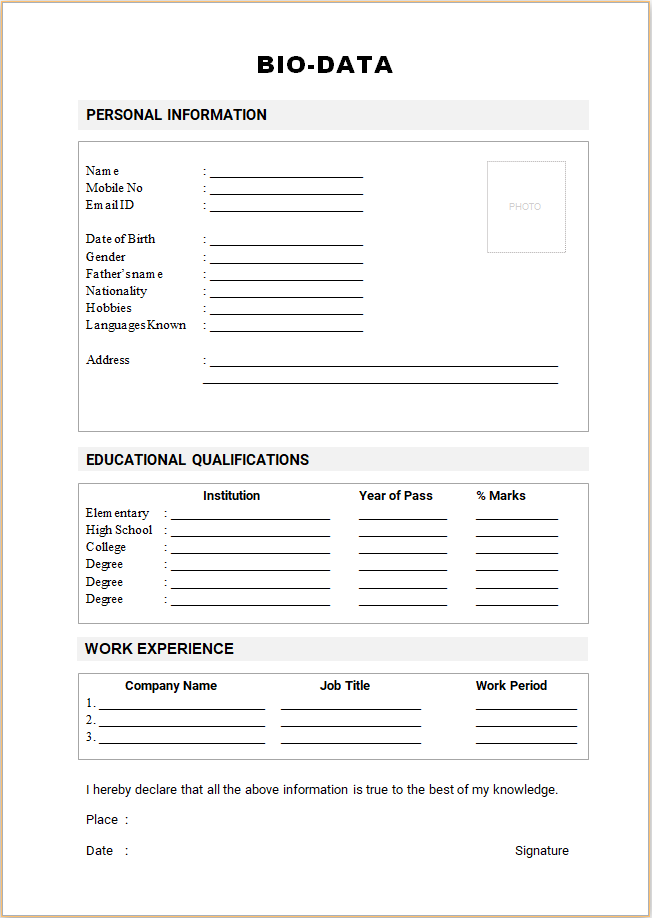Hindu Marriage Biodata Format
Matrimonial biodata format in MS Word

Biodata format
How to create a biodata for marriage
1. Begin with the Basics:
Start your biodata with essential details such as your name, age, height, and other vital statistics. Include information about your educational background, profession, and current location. Make sure to keep this section concise and easy to read.
2. Express Your Personality:
Use the 'About Me' section to share insights into your personality. Highlight your values, beliefs, and the qualities that define you. Keep it positive and authentic. Consider including a quote or a personal motto that resonates with you.
3. Educational and Professional Background:
Detail your academic achievements and professional qualifications. Mention your alma mater, degree, and any notable academic honors. When describing your professional life, focus on key responsibilities, achievements, and career aspirations.
4. Family Background:
Provide a brief overview of your family, including the number of siblings, their occupations, and any other relevant details. This section helps potential matches understand your family dynamics and values.
5. Interests and Hobbies:
Share your interests and hobbies to give a glimpse into your lifestyle. Whether you enjoy reading, traveling, or pursuing specific hobbies, this section can serve as a conversation starter and a way to find common ground with potential partners.
6. Expectations from Partner:
Clearly articulate your expectations from a life partner. Be honest about the qualities you value in a relationship, such as shared values, communication, or specific lifestyle preferences. This helps align expectations from the outset.
7. Photographs:
Include recent, high-quality photographs that showcase different facets of your personality. Use a mix of formal and informal pictures to provide a well-rounded view. Remember, the first impression matters, so choose images that reflect your best self.
8. Astrological Details (Optional):
If astrological compatibility is a significant consideration, include relevant details such as your date, time, and place of birth. This is an optional section and can be included based on cultural preferences.
9. Contact Information:
End your biodata with contact details, including your email address and phone number. Ensure that the information provided is accurate and up-to-date. It's essential for potential matches to be able to reach you easily.
10. Proofread and Format:
Before finalizing your matrimonial biodata, thoroughly proofread the content for grammatical errors and clarity. Ensure that the formatting is clean, with a consistent font and layout. A well-presented biodata reflects attention to detail and professionalism.
Conclusion:
Creating a matrimonial biodata is an art that involves striking a balance between sharing essential information and projecting your unique personality. Tailor each biodata to suit individual preferences and cultural considerations. Remember, your biodata is a tool to facilitate meaningful connections, so be genuine, positive, and open to the possibilities that lie ahead.
Additional Inputs
Protecting Your Privacy: A Guide to Safe Sharing on Marriage Biodata
Creating a marriage biodata is a significant step in the journey towards finding a life partner. While it's essential to provide relevant information, ensuring your privacy and safety should be a top priority. Here's a guide on how to share personal information safely on your marriage biodata.
1. Limit Sensitive Information:
Avoid including sensitive information such as your home address, detailed financial data, or any other personal identifiers that could compromise your safety. Focus on sharing information that gives a genuine insight into your personality and values without revealing too much detail.
2. Use General Location:
Instead of specifying your exact address, consider mentioning your general location, such as the city or region. This provides potential matches with an idea of your location without compromising your privacy.
3. Be Mindful of Contact Details:
While it's necessary to provide contact information for communication, consider sharing only a primary email address or a dedicated phone number. Avoid sharing information like your work address or personal phone numbers until you establish a level of trust.
4. Secure Your Social Media:
If you choose to include social media profiles on your biodata, review your privacy settings. Ensure that your profiles are appropriately secured, limiting the visibility of personal information to only those you trust.
5. Verify the Platform's Security:
If you're using an online platform or website to share your marriage biodata, ensure that the platform prioritizes user privacy and data security. Read the privacy policy and understand how your information will be handled.
6. Communicate Wisely:
Once you start communicating with potential matches, exercise caution in sharing more personal details. Be mindful of the information you provide until you've established a sense of trust and compatibility.
7. Trust Your Instincts:
If something feels off or if you're uncomfortable sharing certain information, trust your instincts. You have the right to control the information you share, and a trustworthy partner will respect your boundaries.
8. Report Suspicious Activity:
If you encounter any suspicious behavior or requests for excessive personal information, report it to the platform administrators or seek assistance from trusted friends or family members.
9. Educate Yourself:
Stay informed about common online scams and tactics used to exploit personal information. Educating yourself will help you recognize potential threats and protect your privacy effectively.
10. Seek Professional Assistance:
If you have concerns about online safety, consider seeking advice from cybersecurity professionals or online safety experts. They can provide valuable insights and tips on protecting your information.
Conclusion:
Balancing the need to share personal information with the importance of safeguarding your privacy is crucial when creating a marriage biodata. By following these guidelines and staying vigilant, you can navigate the process safely and focus on building meaningful connections.


